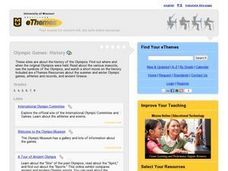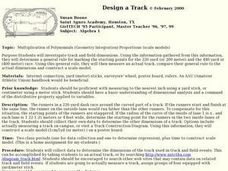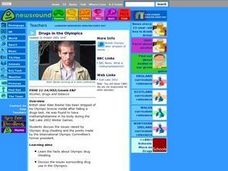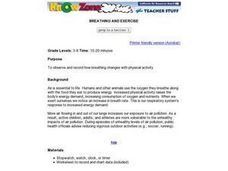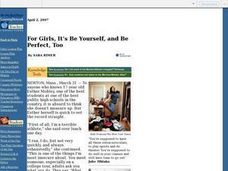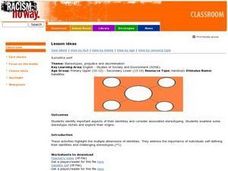Curated OER
Olympic Games: History
Students use the internet to research the history of the Olympic Games. They identify the mascots and symbols of the Games. They watch a short video on the types of sporting events as well.
Curated OER
Breakfast of Champions
Second graders classify foods using the food pyramid and write about the foods they eat. They distinguish between healthy and junk food and make healthy choices for their meals. They listen to the story "No Peas for Nellie" and discuss...
Curated OER
Design a Track
Students investigate track and field dimensions, measure an actual track, and construct a scale model. The use of a meter stick, dimensional analysis, and the application of the distributive property to variables forms the main focus of...
Curated OER
Woman`s History Treasure Hunt
Learners research women in history using the Internet. They complete a teacher made Women's History Treasure Hunt ditto.
Curated OER
Defining success: A debate about success encourages critical thinking skills
Students develop critical thinking skills while exploring new ideas about success, discuss people they consider to be successful, and identify how they measure or define their own personal success.
Curated OER
Exploring Careers in Aviation
Students investigate various careers in the field of aviation in this lesson. They watch and discuss a video, develop a list of careers in aviation mentioned in the video, and create a resume and cover letter for an entry level aviation...
Curated OER
"Who Done It?" Analysis of Molecular Fingerprints Left At the Scene of the Crime
High schoolers examine different types of DNA fragments. They record and analyze their results. They determine who is the criminal in the story.
Curated OER
Reading and Responding: Lesson 6
Teacher reads aloud to the students the material that is printed in boldface type inside the boxes. Information in regular type inside the boxes and all
information outside the boxes should not be read to students. Possible
student...
Curated OER
The Human Mind
Young scholars read and discuss twin studies to explore the debate of nature vs. nurture. They create a list of characteristics and then look for evidence of whether it is primarily a genetic or environmental characteristic. All of the...
Curated OER
Drugs In The Olympics
Students brainstorm and discuss the issues raised by Olympic drug cheating from history as well as today. They bring in examples of individuals who have been accused of drug cheating and examine their situations. In addition, they chart...
Curated OER
Picturing People
Students look at the varied ways the human body is portrayed in contemporary media. They discuss what a character is and how it plays a role in telling stories. Students look at examples of objects like dolls, puppets and toys that...
Curated OER
Breathing Rates and Exercise
Pupils work in groups to predict which condition produces more breaths per minute. Groups record their breathing rates during rest periods and periods of activity. They graph their results and make comparisons to their predictions.
Curated OER
Money Mathematicians
Students compete in a Money Math Olympics. Students work in teams to compete for speed and accuracy working math problems. Students keep track, in their math journals, of the number of problems solved accurately. Teams with the 3 highest...
Curated OER
Working' (More Than) 9 to 5
Students consider how men and women are alike and different, and explore society's expectations of how members of each gender should balance work and family life by taking surveys.
Curated OER
What is An Insect?
Students investigate the concept of an insect. They conduct research about six different insects and identify the different body parts. Students look at the life cycle of the developing monarch butterfly. They also use the library to...
Curated OER
Satellite Self
Students identify important aspects of their identities and consider associated stereotyping. They examine some stereotype cliches and explore their origins.
They address the importance of individuals self-defining their identities and...
Curated OER
The Math Reaction
Students use the reaction time to figure out problems. They use the following example to get them started with reaction time: the edge of a ruler is placed near a person's thumb and index finger and, without warning, the ruler is...
Curated OER
Stereotypes: More Than Meets the Eye
Students explore the concept of stereotyping. They observe images and media that portray the Middle East and its inhabitants. Students make determinations about the impact of the images on their perceptions. They consider ways to...
Curated OER
The Olympic Games
Students research the history of the Olympics and the various countries that have hosted the games. They obtain information about some of the sports featured in the Olympics. Students then create a brochure using Microsoft Publisher.
Curated OER
Let the Games Begin!
Third graders use K-W-L charts to brainstorm a list of questions they would like to answer about sports. While visiting a Web site, 3rd graders research a chosen sport and complete their K-W-L chart.
Curated OER
Descriptive Writing
Fifth graders develop compositions on self-selected topics. They choose a topic based upon their ability. Individual pupils earn points for each activity completed. Students use descriptive writing as they support their composition...
Curated OER
Autobiography
Eighth graders identify key components of an autobiography. They plan and draft an outline of a summer school mini-autobiography and employ peer evaluation in revision step of writing process. They explain difference between revision...
Curated OER
KG Lesson Plan
Eighth graders explore the four major components of an autobiography. As they discuss the major characteristics of an autobiography, 8th graders list the advantages and disadvantages of traditional, word of mouth, tales. Individually,...
Curated OER
Comparing Sparta and Athens
Students are taught the differences between totalitarianism and democracy. They discuss the historical roots of the democratic tradition. Students are introduced to the term totalitarianism and are told that it is a form of government...
Other popular searches
- Physical Education Athletics
- Alcohol and Athletics
- Athletics Children
- Athletics Relay Lesson Plan
- Athletics Lesson Plans
- Athletics Running
- Athletics Primary
- Indoor Athletics
- Athletics Lessons
- Athletics Bulletin Board
- Athletics Jumps
- Women's Athletics


